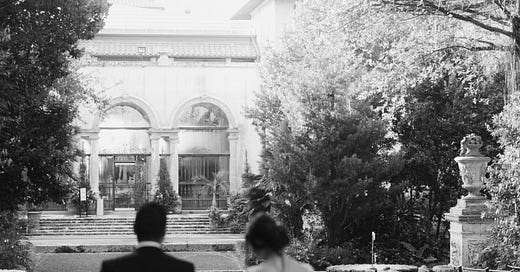Simplicity
“One does not accumulate but eliminate. It is not daily increase but daily decrease. The height of cultivation always runs to simplicity.” - Bruce Lee
Walking to dinner, my wife mentioned that at her job, her colleagues are shocked at how we handled our wedding. Her colleagues had certain expectations of how we would’ve handled such an important day. But what they expected and what we did didn’t align.
Our wedding day was extremely simple. We took photos in the morning, went to the courthouse and got married in the afternoon, and had dinner at a wonderful Italian restaurant in the evening. Two weeks later, we honeymooned in Japan.
No dealing with expensive venues. No dealing with caterers and people’s food preferences. No dealing with what service we should use to mail people’s invitations. None of that stuff.
We just knew this: we were unmarried and wanted to be married and wanted the simplest, most elegant path—from our point of view—to get from point A to point B.
It was great. The photos turned out beautifully. The dinner with our family was lovely. Japan was so much fun. And the thousands we saved have been spent on home renovations and subsequent trips—trips around the US, Spain, South Korea, and Taiwan.
We weren’t trying to impress anyone. We weren’t thinking of others in our decision-making process. We simply thought of the experience we wanted to have and followed our intuition to actualize what was on our minds.
The last thing we wanted was to overcomplicate the whole thing because that’s just how things are done.
As I write this, I’m thinking of a joke I recently heard from Seth Godin on Tim Ferriss’s podcast about how much a wedding should cost. The punchline: “Whatever your friend spent and a little more.”
Yeah . . . no . . . I’ll take the simple wedding, please.
Though I’m talking about my wedding, this way of thinking goes beyond it. It’s a sort of principle, a mindset, I’ve cultivated in how I approach most things in my life.
I believe most things are inherently simple, but we overcomplicate them because we think that’s how things should be.
We overvalue things—whether consciously or subconsciously—that appear elaborate. And because of this overvaluation, we sometimes craft intricate plans in the hopes that they appear more complete, wider, fuller, without realizing that we’ve created unnecessary bloat and unintended complexity.
So, our plan puts us in a position in life where we won’t write until we’ve built a website. We won’t buy the ticket to Asia until X happens. We won’t apply for new jobs until Y happens. We won’t start a business until we’ve earned a degree, perhaps an advanced one. We won’t get married until we’ve mapped out the perfect proposal and wedding. We won’t run until we’ve bought the best running shoes and workout gear. We won’t start organizing and managing our tasks until we’ve identified the best task management software—the best system for managing our to-dos (which may, of course, require reading a few books in advance). We won’t film videos until we’ve researched and purchased the perfect camera, which is at the higher end of our budget, as well as the microphone and courses that must also be bought for us to get started.
We overthink, we overanalyze, and we overcomplicate the whole thing.
Yet its essence is always simple.
You simply need a paper and pencil to write. You can buy a flight to Asia tomorrow on a credit card. You can edit your resume and just start hitting apply. You can start a business within minutes. You can buy a diamond ring (or its alternative, depending on your financial situation) after a few days of research and get down on one knee at a thoughtful location when you’re ready, getting married simply requiring you to say a few words and fill out some paperwork. You can run outside in the shoes you have on right now. You can track your to-dos on a sticky note. You can film with your phone, and after some light editing on free software, publish the final product to the platform of your choice.
Reading the list above seems a bit amateurish, doesn’t it? But it’s the simplest version of a task. If one must choose between a dream unrealized, arrested by the imaginary paralysis caused by carefully crafted complexity, and a dream realized, manifested by a quick spark of simple action, I believe the latter has infinitely more value than the former, no matter how rudimentary it may seem.
When you’ve started, you can slightly improve what you’ve started every week. Over time, the simple thing you began can (and will) become elaborate through consistent upgrades.
What you’ve built—whether a body of work, a career, a family, a lifestyle, a reputation, a library, a business, a skill set, a passport filled with stamps—may eventually look complex (or appear as if it required large amounts of planning) to others, but you will know that it started as something simple and small.
Because you were the gardener who planted and watered that little seed. And you’ll always know that all that was required was intuitive action, consistent care, and the ability to stick around long enough to reap the benefits of progress and growth.




